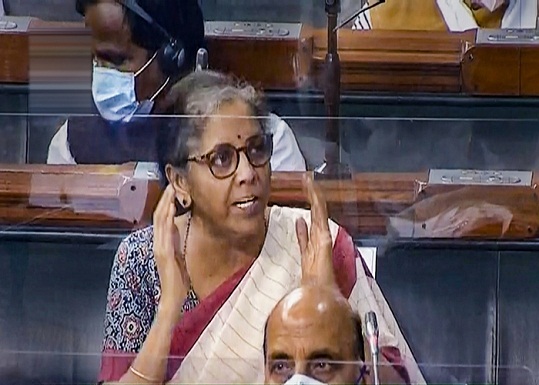Last Updated on September 16, 2020 9:50 pm by INDIAN AWAAZ

Staff Reporter / NEW DELHI
The Lok Sabha today passed the Banking Regulation (Amendment) Bill, 2020, to bring co-operative banks under the supervision of the Reserve Bank of India (RBI).
Finance minister Nirmala Sitharaman assured the House that the legislation empowers the central bank to regulate only the banking activities of co-operatives and it is not applicable to a primary agricultural credit society or a co-operative society providing finance for agricultural development.
The Bill is not to “undermine” the importance of co-operatives, she said. “But, if a co-operative is performing banking functions, there is a need to regulate it… so that it functions professionally,” she said while replying to queries raised by members.
The amendments do not affect existing powers of the state registrars of co-operative societies under state co-operative laws.
Referring to the woes of depositors of Mumbai-headquartered Punjab and Maharashtra Cooperative Bank (PMC) and Bengaluru-based Sri Guru Raghavendra Co-operative Bank due to their lack of professionalism, she said while 430 co-operative banks faced liquidation in the last two decades, not a single commercial bank, whose depositors are protected by the Banking Regulation Act, have gone for liquidation.
The legislation also enables making of a scheme of reconstruction or amalgamation of a banking entity for protecting the interest of depositors without resorting to moratorium that freeze withdrawals by depositors. The Bill replaces an ordinance that was promulgated in pursuance of the commitment “to ensure safety of depositors across banks” by the President on June 26.
Sitharaman said the government was compelled to come out with an ordinance during the lockdown period because conditions of cooperative banks were “grave” and there was “uncertainty” regarding the normal legislative business due to the Covid-19 pandemic. The government had tabled the bill in the Parliament in March this year, but it could not be enacted due to the outbreak of the pandemic.
“During the budget session in March, we introduced this bill in order to have the amendments brought in so that depositors’ interest will be taken care of. But unfortunately, during the budget session, we could not have this bill passed,” Sitharaman said.
Moving the bill in the House, Sitharaman said that financial health of several cooperative banks was becoming “very delicate”. She said that 277 urban cooperative banks were reporting loss and 105 co-operative banks were unable to meet the minimum capital requirement.
